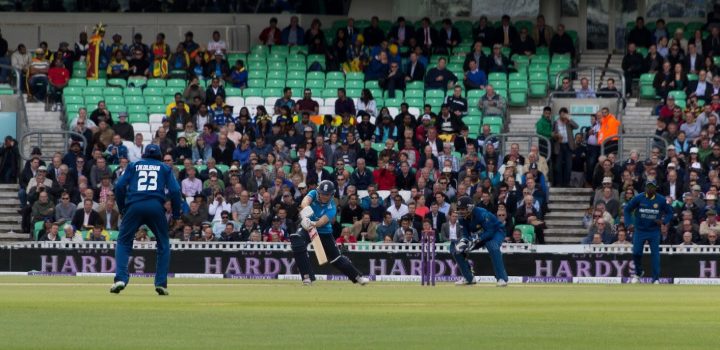England (591-6d) beat India (300 and 283) by an innings and eight runs.
Blimey. It really is going to take a bit of getting used to, this whole ‘England being really good at cricket’ thing. For us supporters, it’s a real culture shock.
As long as I can remember, whenever it emerged in conversation with a non-follower that you were interested in cricket, the one thing you could guarantee they’d know about the sport was that England were crap at it. “Cricket?”, they’d say, “aren’t we supposed to be really rubbish?”. Now the refrain is “aren’t we doing very well?” – which for an England supporter, sounds very odd.
For the first time in generations – and for many of us, our whole lives – everyone involved in an England test match expects us to win. Us, the players, and – crucially – the opposition too.
Yesterday’s play, perhaps more than ever this series, underlined our authority and conviction. Other England sides might have mentally given up, and settled for a draw, in the face of Tendulkar and Mishra’s potentially match-saving partnership of 144. The opposition might have thought they were almost home.
But this time, both sides knew England would still win. Once Mishra’s dismissal opened the door, it was kicked off its hinges by our bowlers’ ruthlessness. There was something very 1990s Australian about it all.
As we’ve argued before, although our side’s dominance feels strange, we should allow ourselves to enjoy it, and congratulate the players for their hard work, vigour and professionalism. They entirely deserve their success, and as perennially long-suffering and loyal supporters, who’ve stuck with them through thick and thin, so do we.
Just how good is this England team? From where we’re sitting, the general consensus seems correct: the team are greater than the sum of its parts; maybe no genuinely great players, but eleven very good ones made brilliantly effective by their cohesion, discipline, controlled agression and focus.
You really have to feel for the former England captains in the commentary box, who were superb players, and gave their absolute all as skipper, but often had little to show for it. Gower, Nasser, and especially Mike Atherton.
Compare the current England XI to the side Nasser fielded ten years ago in the 2001 Ashes. We had some fine players then – Tres, Stewart, Thorpe, Gough, Caddick – but the Australians hammered us 4-1.
What’s changed? On one level, the opposition is much weaker, especially in terms of bowling. Today there is no McGrath, Donald, Wasim, Waqar or Ambrose. Only Dale Steyn induces real apprehension.
It’s more than that, though. Not only are the England of 2011 more thoroughly prepared, and fitter – crucially, they are supremely confident. They expect to win. They know – not hope – they’re good enough. They exude total authority, and have won the psychological battle before the umpire even calls play.
So what now? Obviously we need to beat the Saffers next year, then win in India. There is still a question mark over who bats at six, and no clear-cut choice for second spinner in Asia this winter.
There is no danger of complacency in the dressing room – not under this management. Andrew Strauss put us straight on that in his post-match interview, barely moments after lifting the trophy. But what about on a corporate level?
As Gideon Haigh brilliantly argues in The Times today, the problem with success is that it justifies the way you do things, and mitigates against change.
Our test team’s superb form must not mask the structural faults in English cricket. Children from inner cities and deprived backgrounds have very little access to the game, and can’t even watch it on free TV. If you can’t break into the elite club system, the ECB have little interest in you. Just look at how the test side are dominated by either privately educated or foreign born players.
Meanwhile, many of the county clubs are on the verge of bankruptcy, T20 is tottering, and the fixture schedule is a mess. All of this still needs fixing, even though we whitewashed India.
The other problem with being number one test side in the world is what you do with the trophy. Only in cricket would you think about how to design an important award, and come up with the idea of a mace. Andrew Strauss yesterday was completely nonplussed at what to do with the thing: kiss it, hoist it, wave it around or have a celebratory jiggle? Our skipper may be a fine leader of men on the cricket field, but give him a mace, and he’s all at sea.
Maxie Allen










Great post. As a life long cricket fan I am loving our success, I’ve spent many years watching England teams with four or five really special players in them, and whoever else had looked tasty in county the previous week.
Professionalism in sport certainly brings better results, I just hope it doesn’t take the characters out of the game. Swanny, Bres and Jimmy would seem to suggest that it hasnt yet!
With regards to elitism in the game, I have seen this 1st hand. I have a 12yr old who is knocking on the door of our county age group squad but is struggling to get alongside several of his teammates who have wealthy parents to back them up and pay for 1:1 coaching. I feel for the parents at this stage, your child is talented enough but money and schooling still over come talent every time.
I hate to say it but the system needs to be closer to the football method with scouts picking up talented kids at lower levels instead of relying on the recommendations of district coaches who have everything to gain from putting forward the right children.
Anyway, rant over. Well done England. It makes a changes to be proud to be English in a world that we gave cricket to and then forgot how to play it. Maybe the fact that it’s taken 25 years to fashion a great team is the best example of a system that needs to change.
JGM here. Just a quick comment about my experience of junior cricket (some years ago I’m afraid). The Worcs U-15 team was run by a bloke called Sidney Fudger who insisted that all communication was done through the post. He didn’t have a telephone, and was about 146 years old. Just about sums it up really.
That’s the troube with The Full Toss – you write an excellent piece, but spoil it with a bit of socialism towards the end and a fondness for Mike Atherton’s captaincy in the middle.
Live cricket on the BBC … what utter tosh. The Sky money is directly responsible for central contracts and the excellent back up staff, which are the main reasons England are stronger today than under that FEC Atherton.
Atherton was a) caught cheating while skipper b) was more responsible that any one individual for not getting the best out of GA Hick (THAT declaration, regularally dropping the man, starting him against the WI – Atherton himself started against a weak NZ, if memory serves).
Thanks for your interesting comments!
I said that Atherton “gave his absolute all” as captain; he cared very deeply about the role and committed himself fully. I didn’t say that he got every decision right. Although it’s worth pointing out he actually made his debut in 1989 against a rampant Australian side.
I don’t think it’s socialist to suggest that the ECB should do more to widen access to the game. It’s actually in the interests of even the most self-centred – the more people who take up cricket, the greater the pool of potential high-class international players.
As for the Sky money – what’s the point of England doing so well if most people can’t get to watch it? And anyway, central contacts and extensive back-room staff were both introduced before Sky took over in 2006.
As I know one half of the Full Toss extremely well, I can assure you that he is certainly not a socialist! Mr Alec S (Alec Stewart I presume ;-)) you make some good points – yes, central contracts have helped a great deal – but have you considered that all the talent England have coming through the ranks is due to the fact that the Ashes in 2005 were on free-to-air TV. Several young players in county cricket have attributed their love of the game to watching Channel 4. The youngsters who fell in love with cricket during that series (not every household has Sky) are now, 6 years later, the up and coming pros. Surely a balance must be struck somewhere along the line? It isn’t good to have NO live cricket on free to air TV. The Channel 5 highlights are the absolute minimum we should have. Maybe the BBC should start showing some county games again?
Not sure about that – I know James has all of Michael Foot’s speeches at the Labour Party Conference 1972 – 1978 on video as an inspiration to help with his Full Toss articles.
I also own a duffle coat. I’ll deal with you later Goose. This is slanderous! ;-)
On an entirely unrelated point, if you didn’t already see it last night on BBC2, try to catch Shooting Stars on the BBC i-Player – featuring our very own Jimmy Anderson.
Bish
Like Mark, as a life long cricket fan I am really enjoying England’s recent success without worrying about our dominance or the quality of the opposition.
Yes we can’t get complacent, as being sucessful can lead to self serving justification of your methods – just ask the Australians about the recently concluded review following their last Ashes thrashing (and rather amusing that they are now trying to copy us).
It is simplistic to say that public school and wealthy parents, or only sky coverage is the problem. The ECB have to balance many different factors. Trade offs are necessary not optional. Sky’s money has played it’s part in England’s success, but the lack of free to air coverage is the downside. The balance will never comfortable but as long as it is reviewed regularly and honestly then they have a chance. The comparison with grass routes scouts is interesting but is actually a function of money. Most counties cannot afford scouts or coaches for anything but the highest levels relying heavily on volunteers with the problems described above, the ECB can only afford regional development officers. Yet in football a club like Leyton Orient can afford paid scouts and coaches for youth football – that is like Northwick Village having scouts!
Basically, we can sum it up in one word. Rupert Murdoch. I for one missed live cricket for neighbours, horse racing and a bit of golf. I still don’t know whether Trevor Franklin got his hundred in 1990. I’ve never been picked for England and I’m minted. I don’t care who knows it. But that Rupert Murdoch, he’s a disgrace.